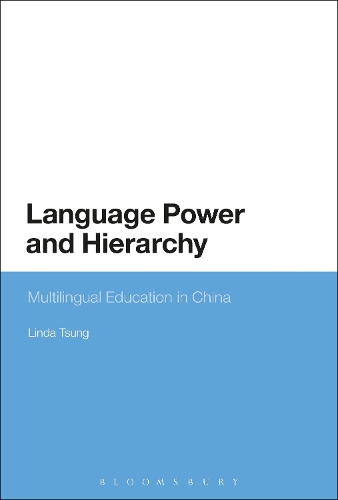
Language Power and Hierarchy: Multilingual Education in China
(Paperback)
Available Formats
Publishing Details
Language Power and Hierarchy: Multilingual Education in China
By (Author) Dr Linda Tsung
Bloomsbury Publishing PLC
Bloomsbury Academic
21st April 2016
United Kingdom
Classifications
Tertiary Education
Non Fiction
Educational strategies and policy
306.4460951
Physical Properties
Paperback
264
Width 156mm, Height 234mm
376g
Description
Shunning polemicism and fashioning a new agenda for a critically informed yet practically orientated approach, this book explores aspects of multilingual education in the People's Republic of China (PRC). Amongst other issues, it also looks at the challenges associated with bilingual and trilingual education in Xinjiang and Tibet as well as the mediation between religion and culture in multi-ethnic schools, covering these issues from a range of perspectives - Korean, Uyghur, Tibetan, Mongolian and Yi. The PRC promotes itself as a harmonious, stable multicultural mosaic, with over 50 distinct ethnic groups striving for common prosperity. Beneath this rhetoric, there is also inter-ethnic discord, with scenes of ethnic violence in Lhasa and Urumqi over the last few years. China has a complex system of multilingual education - with dual-pathway curricula, bilingual and trilingual instruction, specialised ethnic schools. This education system is a lynchpin in the Communist party state's efforts to keep a lid on simmering tensions and transform a rhetoric of harmony into a critical pluralistic harmonious multiculturalism. This book examines this supposed lynchpin.
Reviews
Tsungs book is an important resource, a ground-breaking study that fills a gap in our understanding of multilingualism, language policy, social change and education in China. The country now requires improved multilingual education in order to create a harmonious society, and this book can be a catalyst for change. * Journal of Multilingual and Multicultural Development *
In addition to its data-rich survey of Mongolian, Uighur, Tibetan and other minority language instruction across China, Linda Tsungs brilliant new study casts new light on theoretical and practical issues surrounding multilingualism as a global phenomenon and its impact on social, cultural, social and political life in contemporary China. -- Bonnie S. Mcdougall, Visiting Professor in the Department of Chinese Studies, University of Sydney, Australia
Linda Tsung's book is a ground-breaking study of the complex issue of multilingualism in contemporary China. Backed by primary sources and years of extensive fieldwork in vast Chinese ethnic minority regions, the author reveals the challenges that all stakeholders must face in negotiating the tension among the diverse forces of globalization, nationalization, language maintenance, social development, among others. It is as theoretically fascinating for linguists as practically valuable for policy makers. -- Hongyin Tao, Professor of Chinese Language and Linguistics, University of California, Los Angeles and (2014) President of the Chinese Language Teachers Association, USA
Linda Tsung does what few linguists do well: she takes us into a mysterious world and shows us what the sociolinguistic reality is like there. This is the first book that has empirically and systematically examined the multilingual norms and multilingual education in China, a nation now standing at the crossroads with confusion, and hesitation. -- Hui Li, Associate Professor, Faculty of Education, The University of Hong Kong
This book is both an empirically rich account and theoretically significant critique of Chinas policies and practices of multilingualism and multilingual education Skilfully navigating amongst several different ethnic minority languages and communities in China, Linda Tsung directs us to the opportunities and challenges of multilingualism. The book is of relevance to a wide range of people interested in language policy, education, and social change in China. -- Li Wei, Professor of Applied Linguistics, Birkbeck College, University of London, UK
Author Bio
Linda Tsung is an Associate Professor in the Faculty of Arts and Social Sciences, The University of Sydney, Australia.
